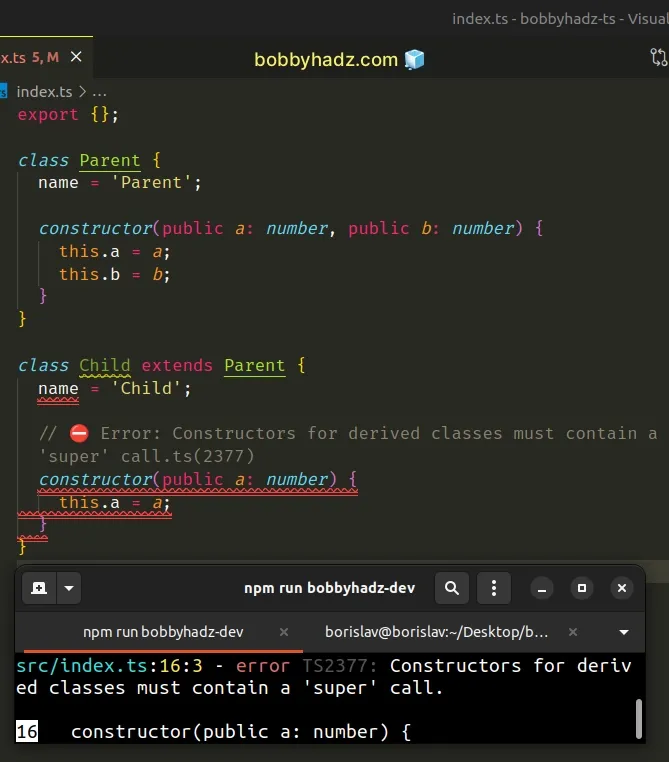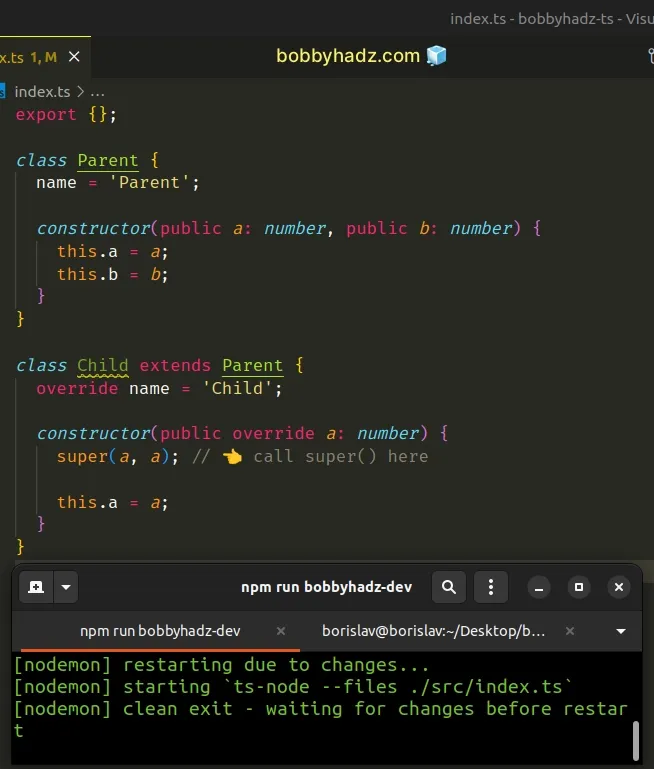Constructors for derived classes must contain a super call
Last updated: Feb 28, 2024
Reading time·3 min

# Constructors for derived classes must contain a super call
The error "Constructors for derived classes must contain a super call" occurs
when a parent class is extended without calling the super() method in the
constructor of the child.
To solve the error, call the super() method in the constructor of the child
class.
Here is an example of how the error occurs.
class Parent { name = 'Parent'; constructor(public a: number, public b: number) { this.a = a; this.b = b; } } class Child extends Parent { name = 'Child'; // ⛔️ Error: Constructors for derived classes must contain a 'super' call.ts(2377) constructor(public a: number) { this.a = a; } }

We can't access the this keyword in the constructor of the child class without
calling the super() method first.
# Call the super() method in the child class's constructor
To solve the error, call super() in the child class's constructor.
class Parent { name = 'Parent'; constructor( public a: number, public b: number, ) { this.a = a; this.b = b; } } class Child extends Parent { override name = 'Child'; constructor(public override a: number) { super(a, a); // 👈️ call super() here this.a = a; } }

The super() method should be called before accessing the this keyword in the
child's constructor.
super() call depends on what parameters the parent class's constructor takes.In the example, the constructor of the parent class takes 2 parameters of type
number.
# Calling super() calls the parent's constructor() method
You have to provide all of the parameters the parent class takes because when
you call the super() method, you're actually calling the constructor of the
parent class.
super() method, you are able to use the this keyword in the constructor of the child class.You can imagine that the super keyword is a reference to the parent class.
You might also see the super keyword used when a child has to refer to a
method of a parent class.
class Parent { name = 'Parent'; constructor( public a: number, public b: number, ) { this.a = a; this.b = b; } doMath(): number { return this.a + this.b; } } class Child extends Parent { override name = 'Child'; constructor(public override a: number) { super(a, a); this.a = a; } override doMath(): number { // 👇️ super.doMath() calls doMath method of parent return this.a * this.a + super.doMath(); } } const child1 = new Child(3); // 👇️ (3 * 3) + (3 + 3) = 15 console.log(child1.doMath()); // 👉️ 15
doMath method and uses the super keyword to invoke the doMath method of the parent class.These are the 2 most common uses of the super keyword in classes:
- invoke the parent's constructor, so you can use the
thiskeyword - refer to methods of the parent class when overriding them
I've also written an article on how to create a custom class that extends from Error.
# Additional Resources
You can learn more about the related topics by checking out the following tutorials:
- TS: 'new' expression whose target lacks construct signature
- This expression is not callable. Type 'X' no call signatures
- Unexpected token. A constructor, method Error in TS [Fixed]
- Class implementing Interfaces in TypeScript
- A class member cannot have the 'const' keyword in TS [Fixed]
- An outer value of this is shadowed by this container in TS

